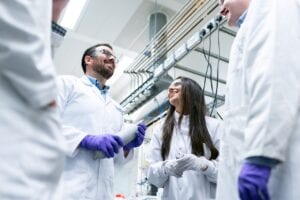Acid Sphingomyelinase Deficiency
What is Acid Sphingomyelinase Deficiency?
Acid Sphingomyelinase Deficiency (ASMD), also known as Niemann-Pick Disease Types A (NPD A) and Type B (NPD B), is a very rare, but serious and potentially life-threatening genetic disorder that causes accumulation of the unmetabolized lipid sphingomyelin in cells, resulting in damage to major organ systems. ASMD classified as a lysosomal storage disease.
If a patient has infantile neurovisceral ASMD, the live expectancy is about 3 years of age. Chronic ASMD patients with complications can die in childhood, but may patients reach adulthood.What are the symptoms of Acid Sphingomyelinase Deficiency?
Common symptoms of ASMD include the following:- Swollen liver and spleen
- Progressive neurological symptoms
- Cholesterol abnormalities
- Reduced platelet counts
- Pulmonary damage
- Cherry red maculae
- Feeding problems
- Failure to thrive
- iIrritability
What causes Acid Sphingomyelinase Deficiency?
ASMD is caused by mutations in the SMPD1 gene that encodes for the enzyme acid sphingomyelinase (ASM), which metabolizes sphingomyelin (a lipoid). ASMD is an autosomal recessive genetic disorder in which the patient inherited two mutated genes, one from each parent. Typically the parents are both carriers of ASMD, but their health is rarely affected. Sphingomyelin is involved in a variety of functions in the cell which includes both cell proliferation and cell cycle progression. When not metabolized, it accumulates and can cause substantial damage to the lungs, spleen and liver. Neuronopathic damage has been noted in severe cases.How is Acid Sphingomyelinase Deficiency diagnosed?
ASMD is very rare and the differential diagnosis can be quite difficult to resolve, which can result in delayed diagnosis and management of patients. An initial diagnosis is often based on biochemical testing showing low residual ASM enzyme activity using dried blood spots as blood-based assays. Additional confirmatory testing options of ASM activity include leukocytes, peripheral blood lymphocytes, and skin fibroblast cultures.What are the treatments for Acid Sphingomyelinase Deficiency?
ASMD does not have an approved treatment option.Where can I find out more about Acid Sphingomyelinase Deficiency?
Acid Sphingomyelinase Deficiency Articles

Drugs for Pompe Disease and ASMD Will Soon Be Available in India
Jessica Lynn
June 20, 2023
Read More »

The FDA Approves XenpozymeTM for Non-CNS Symptoms of ASMD
Rose Duesterwald
September 6, 2022
Read More »

New Treatment Approved in EU for Acid Sphingomyelinase Deficiency
James Moore
July 7, 2022
Read More »

A New Treatment for Acid Sphingomyelinase Deficiency Could be Approved in the EU Soon
James Moore
May 25, 2022
Read More »

Japan Approves Xenpozyme for Acid Sphingomyelinase Deficiency (ASMD)
Jessica Lynn
March 30, 2022
Read More »

Qualitative Study Highlights Need for Increased ASMD Caregiver Support
James Moore
February 28, 2022
Read More »

Experimental Treatment for Acid Sphingomyelinase Deficiency Shows Potential in Trials
James Moore
November 10, 2020
Read More »

Advocating for Acid Sphingomyelinase Deficiency: A Rare Disease Story
James Moore
November 5, 2020
Read More »






